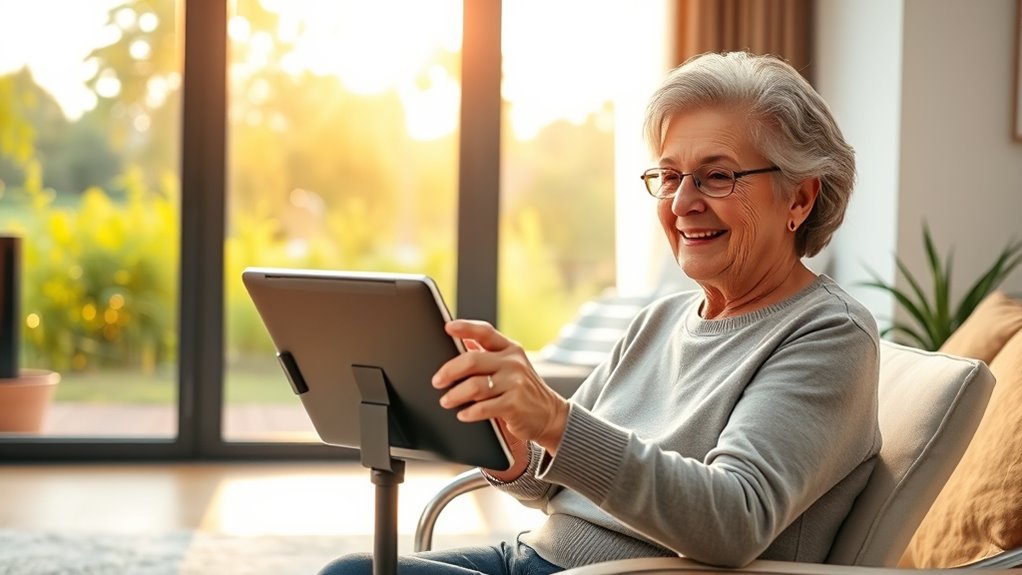In 2025, telehealth makes healthcare more convenient and accessible for you by allowing you to connect with providers from home, saving travel time and reducing stress. You can remotely monitor your health with real-time data, catch potential issues early, and avoid unnecessary visits to the doctor. It also offers mental health support that’s easy to access, helping you stay emotionally balanced. If you’re curious about how these benefits can improve your daily life, there’s more to discover ahead.
Key Takeaways
- Telehealth enhances convenience by enabling seniors to access healthcare and mental health services from home, reducing stress and travel needs.
- Real-time remote monitoring devices improve health data accuracy and early detection of issues, preventing hospital visits.
- Virtual counseling and mental health support help seniors maintain emotional well-being and social connection remotely.
- Telehealth empowers seniors with proactive management of chronic conditions and access to educational resources for healthier living.
- Evolving personalized care options in 2025 ensure timely, tailored support that boosts overall well-being and independence.

Telehealth has become a pivotal resource for seniors, providing convenient access to healthcare without the need to travel. This technological breakthrough allows you to connect with healthcare providers from the comfort of your home, saving you time and reducing stress. One of the most significant benefits is remote monitoring, which enables your doctors to keep a close eye on your health conditions in real-time. Devices like blood pressure cuffs, glucose monitors, and wearable sensors transmit data directly to your healthcare team, allowing for prompt adjustments to your treatment plan. This continuous oversight helps catch potential issues early, preventing complications and avoiding unnecessary hospital visits. It gives you peace of mind knowing your health is being closely watched, even when you’re not physically in a clinic.
Telehealth offers seniors real-time health monitoring and peace of mind from the comfort of home.
Another essential aspect of telehealth is mental health support. As you age, mental health can sometimes take a backseat, but telehealth makes it easier to seek help whenever you need it. Virtual counseling sessions eliminate the barriers of transportation and mobility, making mental health care more accessible than ever. Whether you’re dealing with anxiety, depression, or loneliness, you can connect with licensed therapists and counselors through secure video calls. Regular virtual check-ins can help you develop coping strategies and stay emotionally balanced, which is especially important during times of social isolation or life changes. Telehealth’s convenience encourages you to prioritize your mental well-being without the stigma or logistical hurdles that might have previously kept you from seeking help.
Beyond just addressing specific health issues, telehealth fosters a proactive approach to aging. With easy access to both physical and mental health services, you’re more likely to stay on top of your wellness routine. You can schedule follow-up appointments, ask questions, and receive guidance without the hassle of traveling to a clinic. This seamless integration of care helps you feel empowered and in control of your health journey. Additionally, telehealth platforms often include educational resources tailored for seniors, so you can learn more about managing chronic conditions or adopting healthier habits. Moreover, advancements in remote monitoring technology have improved the accuracy and reliability of health data transmission, further enhancing the quality of virtual care.
In 2025, telehealth continues to evolve, making healthcare more personalized and accessible. Remote monitoring and mental health support are just two examples of how these services directly benefit you, offering convenience, early intervention, and emotional stability. Embracing these tools means you can enjoy a better quality of life, knowing your health is monitored and supported whenever you need it, all from the comfort of your home.
Frequently Asked Questions
How Does Telehealth Improve Mental Health Support for Seniors?
Telehealth enhances mental health support for seniors by providing easy access to virtual counseling, eliminating travel barriers and wait times. You can connect with mental health professionals from the comfort of your home, helping to bolster your emotional well-being. This convenience encourages regular check-ins, reduces feelings of loneliness, and guarantees timely intervention, making mental health care more accessible and effective for seniors seeking support.
What Technology Skills Are Needed for Seniors to Access Telehealth?
You might worry about tech skills, but don’t fret. To access telehealth, you need basic digital literacy and device familiarity. Learning to navigate your smartphone or tablet, open apps, and connect to video calls is straightforward with some practice. Many programs offer tutorials or support, making it easier than you think. Once comfortable, you’ll find telehealth a convenient way to get healthcare from home.
Are There Privacy Concerns With Telehealth for Elderly Patients?
You might worry about privacy concerns with telehealth for elderly patients. It is crucial to prioritize data security, ensuring your health information stays protected. Healthcare providers should obtain informed consent, clearly explaining how your data is used and stored. By staying informed and asking questions, you can confidently use telehealth services, knowing your privacy is safeguarded. This way, you enjoy the convenience of virtual care without compromising your personal information.
How Does Telehealth Address Emergency Medical Needs for Seniors?
Imagine a safety net woven with technology—telehealth becomes that for seniors. It quickly addresses emergency medical needs through remote diagnostics, enabling swift assessment and response. With built-in emergency alerts, seniors can summon help instantly, no matter where they are. This seamless connection guarantees prompt care, providing peace of mind for both seniors and their loved ones, transforming emergency response from a worry into a reassurance.
Can Telehealth Reduce Transportation Barriers for Seniors’ Healthcare?
You can see how telehealth helps reduce transportation challenges for seniors facing mobility issues. Instead of traveling to appointments, you access healthcare from home, saving time and effort. This approach minimizes the need for rides or public transportation, which can be difficult for those with limited mobility. Telehealth consequently makes healthcare more accessible, ensuring you get the care you need without the stress or inconvenience of transportation barriers.
Conclusion
By embracing telehealth, you open a door to a world where healthcare is a gentle bridge over turbulent waters, guiding you safely home. It’s like having a caring lighthouse shining through foggy nights, ensuring you never feel lost or alone. As technology becomes your trusty compass, your health journey transforms into a smooth sail across calm seas. Embrace these digital waves, and watch your golden years glow brighter with every connected moment.









